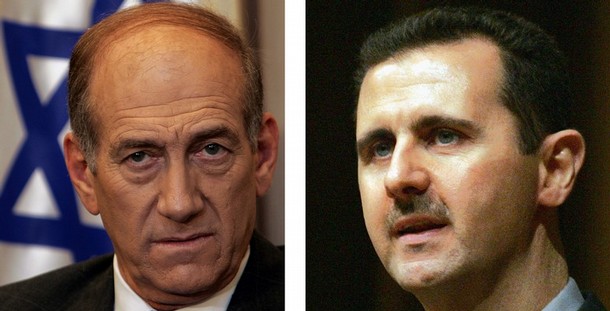
Prime Minister of Israel Ehud Olmert Syrian President Bashar al-Assad
The fighting in the Gaza Strip may have hurt Hamas' ability to fire rockets at southern Israel, but Syria's leader is sure the "victory" will provide groundwork for political gains in any regional settlement with Tel Aviv.
Syrian President Bashar al-Assad on Tuesday congratulated Damascus-based leaders of the Palestinian factions for their "victory," which he said "should be exploited politically to maintain Palestinian rights, including the right of return," according to official sources.
Nine exiled leaders attended the meeting, including Hamas Politburo chief Khaled Mashaal, Secretary General of the Islamic Jihad Movement Ramadan Abdullah Shallah and Secretary General of the Popular Front for the Liberation of Palestine-General Command (PFLP-GC) Ahmad Jebril, the source said.
"The delegation thanked Syria for its support and affirmed determination to continue the resistance until they establish a Palestinian state with Jerusalem as its capital," he added.
Gaza's tragedy has still been playing out on the world's TV sets, although the 22-day offensive ended last week, leaving at least 1,300 Palestinians dead, half of them children and women, according to sources in the territory.
The use of tremendous military force by Israel did not extinguish the militants' ideological zeal. Syrians, like many of their Arab neighbors, have been glued to the screens or taking to the streets to demonstrate against Israel, burning flags and chanting slogans against the Jewish state.
While European nations and, of course, the United States, refuse to talk to Hamas until it recognizes Israel, renounces violence and accepts interim peace deals signed by the Palestine Liberation Organization, many observers suggest the group should be engaged in any political process, either directly or indirectly through Damascus.
The Palestinian faction received a huge political boost two weeks ago when its leaders attended the top-level gathering of the so-called "hardline" Arab countries (as well as Iran's Mahmoud Ahmadinejad, who is viscerally hostile to Israel) for the first time.
Mashaal, along with the leaders of Islamic Jihad and the PFLP-GC (which also fought Israel in Gaza), flew to Doha from Damascus on the Emir of Qatar's private plane.
Israel accuses Syria and Iran of supporting and arming Hamas, an accusation they deny.
Syria and Israel, which have not held face-to-face talks in decades, held four rounds of indirect talks last year mediated by Turkey, but the talks on the future of the Golan Heights made no significant headway and it is not clear when they might resume after Damascus called them off to protest the Gaza war.
No question, Syria gained points on the Arab street for publicizing a hard-line stance against Israel, though it is constantly looking for ways to prove its worth to potential Western allies.
Syria was at the center of international efforts to end the war. French President Nicolas Sarkozy flew to the Syrian capital to urge Assad to pressure Hamas to bring an end to the fighting, as did U.N. Secretary General Kofi Anan, and others.
France, in fact, did hold talks directly with Hamas behind the scene, according to Western diplomats.
"For the first time, there was such a meeting. Former French Foreign Minister Jean Francois-Poncet and another Parliamentarian met Mashaal and exchanged views on latest developments," one diplomat said.
But Mr. Obama's Middle East envoy's first trip to the region will exclude Syria, although Assad was hoping for a thaw in relations with Washington, stressing in recent interviews his readiness to engage in a fruitful dialogue that would help in bringing peace to the Middle East.
Syria's relations with the U.S. struggled under the administration of former president George W. Bush, amid U.S. accusations that Damascus was turning a blind eye to the arming and funding of insurgents in neighboring Iraq.
But top officials here sounded at ease with George Mitchell's nonappearance, revealing that the chief of the Senate Foreign Relations Committee, Sen. Howard Berman, was scheduled to see Assad next month in Damascus in an effort to bolster relations. The delegation is one of three to be dispatched to Syria in February, according to a Syrian source.

No comments:
Post a Comment